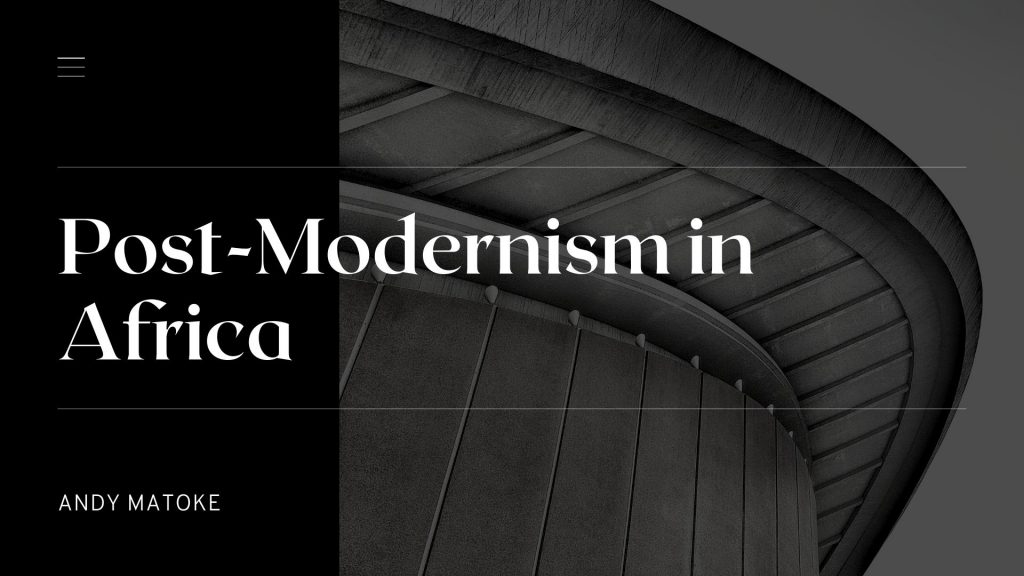
For those of us living in Africa, it would seem irrelevant to talk about post-modernity. This is a word that you barely hear anyone use even in very serious conversations. But just because the term is absent does not mean that the reality of it is not present. Moreover, there is not much that is written on the subject of post-modernity in Africa, but a quick look at wider books on this topic will prove that the definition of post-modernity is as varied as the authors themselves. However, there is consensus across the board on its reality and that is why theologians and historians bother with this term.
A diachronic approach might be of help as a beginning. The word “postmodernity” is made of two other words: post and modern. At the very basic level, this means that postmodernity came after modernity or the age of modernity. The period of modernity was clearly marked with absolutes, right or wrong, unshakeable, or unquestionable foundations about truth and life. The antithesis to modernity is now postmodernity. This was a speedy reaction against the mentioned tenets of modernity. The primary discontinuity that exists between these two periods in history is in the area of what is called epistemology, or the way we can know or gain knowledge. According to the period of thought known as modernity, there were established foundations that were the basis upon which we gained knowledge. For example, the belief in a divine universal God was almost an unquestioned tenet. Killing, cheating, or stealing were viewed across the board as evil not only to be shunned against but also punished. Even when theism was questioned there were enough intellectual structures in place to help one arrive at a theistic conclusion. But when postmodernity arrived these very foundations were not only questioned but replaced. Therefore, the absolutist modernist convictions were no longer self- evident.
So, according to postmodernism, how we arrive at the truth is no longer dependent upon agreed tenets, but on the individual. D.A. Carson asserts that “post-moderns, no less than moderns, begin with the finite ‘I,’ but the inferences they draw are quite different. Each ‘I’ is different from every other ‘I,’ so the point of view expressed is bound to be different…. After all, each individual ‘I’ is a member of a defined culture with a particular set of assumptions, values, structures of thought, linguistic usages, and the like. Each group, culture, or identifiable unit of people will invariably look at things a little differently from the way people in other cultures look at things.”[1]
Therefore, postmodernism produces several things. Firstly, truth invariably becomes relative. So that whatever you think is true is only true because of where you grew up, what your culture thought was important, and so forth. One cannot dare to be objective or dogmatic about anything, and if you dare to be then that is just relative to you.
Secondly, you cannot question or critique anyone. Any such attempt and you will be labeled as intolerant, narrow-minded or bigoted.
Thirdly, since everyone has a valid truth, we must accept each view. Inclusivity is hailed as a big virtue.
Lastly, when it comes to matters of religion you should treat them as private lest you offend your neighbor who might have a valid religious belief, though different than yours.
I hope you have already seen that this kind of postmodernism is rife among us. I hope your Biblical grid is already helping you to see the errors in postmodernism. Brethren, I hope you have started to shun any view or model in today’s society that seems to suggest that you are the source of truth, that there are no absolutes, or that truth is relative to an individual, culture or community. Yes, we are finite and sinful beings, and thus not able to know everything perfectly. But it will be even worse if we heed or embrace the so-called “only alternative” offered by postmodernism. That is relativism. The omnipotent gracious God has promised that He is able to open the eyes of our understanding that we may see wondrous things from His Word (Psalm 119:18). The Triune God has revealed Himself in the Scriptures and has promised us that we shall “know the truth and the truth shall set [us] free” (John 8:31–32). Isn’t this such a great comfort! That though we are sinful and blind the Lord gave up His Son as the light of the world that whoever believes in Him shall have eternal life. In a wicked world that is in limbo, tossed to and fro with every wind of doctrine, we have a God who we can approach to direct our hearts to be anchored? We look to Christ as revealed in the Bible. He is the way, the truth, and the life (John 14:6). He is the only name under heaven given among men by which they can be saved (Acts 4:12). God’s word is the truth: dependable, divine, sufficient, a sanctifier, food for the soul, and a life-giver. In a world that says that every religion has something to contribute the Scriptures warn us that he who does not abide in the teaching of Christ does not have God (2 John 9).
We have a message to proclaim to a confused and perishing world. A world that is trusting in the arm of flesh, the arm of intellect, the arm of self-image, the arm of independence. We can confidently point them to, “Thus says the Lord!” Let’s point them to the Word of Life. Let’s expound the breathed-out Word of God which is “profitable for teaching, for reproof, for correction, for training in righteousness, that the man of God may be complete, equipped for every good work” (2 Tim. 3:16, 17).
[1] D.A. Carson, Becoming Conversant with the Emerging Church (Grand Rapids, Michigan: Zondervan, 2005), 95.